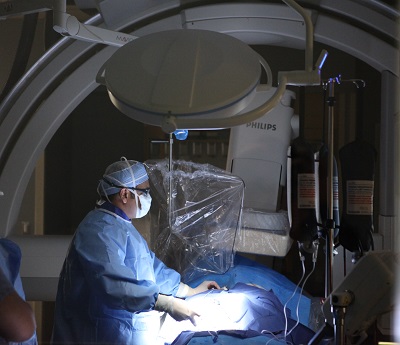
Interventional neurologist Dr. Aniel Majjhoo performing an interventional procedure.
When considering the risk of stroke, many people will factor their age in "“ if they don't consider themselves to be of advanced age, they consider themselves to be low-risk.
But the fact is that stroke can attack anyone at any time.
Being aware of the risk factors that increase the chances of stroke, and taking notice of any signs and symptoms can be potentially life-saving.
Risk factors:
- High blood pressure (a main risk factor)
- Diabetes
- Heart disease
- Race and ethnicity
- Family history
- History of stroke, TIA or brain aneurysm
Act F.A.S.T. if you or a loved one are experiencing stroke-like symptoms.
FACE:
Is one side of the face drooping?
ARMS:
With arms raised, is one drifting downward?
SPEECH:
Is speech slurred or sound strange?
TIME:
Strokes require immediate medical intervention. With all suspected strokes, call 9-1-1 immediately.
Should a stroke occur, receiving timely, interventional treatment from physicians capable of providing the standard of care that meets national guidelines is critical.
"A stroke, with its sudden onset of disability, can be very frightening," said Dr. Aniel Majjhoo, interventional neurologist and stroke medical director at McLaren Macomb. "Patients don't need any added anxieties "“ they should know their care is in the hands of proficient physicians performing treatments that result in the best possible outcomes."
The McLaren Stroke Network at McLaren Macomb is received an Advanced Certification for Primary Stroke Centers by The Joint Commission and earned the Get With The Guidelines ®-Stroke Silver Plus and Target: Stroke Honor Roll Elite from the American Heart Association/American Stroke Association.
To learn more about the McLaren Stroke Network at McLaren Macomb, visit mclaren.org/macombstroke.